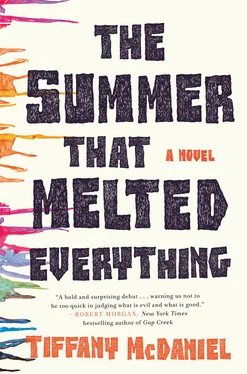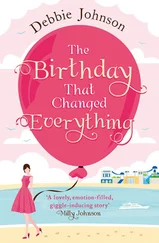I looked out the car window as we drove away, at her standing in the front yard. Her yellow handkerchief was her wave. Sal was the only one to wave back.
I faced front, straightening my tie. Mom had bought Sal a suit as well, and while I wore my tie like a heavy laying on the chest, Sal’s was more like a gentle dropping. He looked at home in a black suit. Sometimes when I think of him now, I see him in that suit, a small form crying on a pew out in the middle of an overgrown field. A tractor going behind him. His shoes shiny on dull soil.
On the way to the cemetery, we passed Elohim and his followers. They were standing in the woods, close enough to the edge to see them. I glanced at Dad and Sal. Dad was staring straight ahead. Sal was looking out the other window. I was the only one who saw Elohim, the little garter snake slithering in his hand.
The cemetery was a flat-top meadow on one of the hills. It was called Reflection Hill because if you were buried there, your stone was a full-body effigy of yourself, laid on the ground. Your reflection, hence the cemetery’s name.
Once everything was set up graveside, Sal stood before us with Grand’s dog-eared Leaves of Grass and said a little something about the brother lost to him.
“He existed. Hurrah! He existed, and we shall be each moment celebrating him and singing him and through eternity, we shall hold him with our strong hearts. And strong we must be because we cannot stop in the night, for the powerful play goes on, and you may contribute a verse. The powerful play goes on, and you, dear Grand, have contributed your beautiful verse.”
Sal laid the book on top of the grandfather clock. And then Grand’s teammates, the very ones who had turned from him, stood in a line by the side of his body. Like the marine gun salute, they tossed balls up into the air and hit them out. It wasn’t perfect. I even think there were a couple of the players who failed to hit their ball, but no one noticed. To all of us, the swings were in unison and the balls flew as the same. Two more times they did this. Two more times it was perfect.
I still remember the sound of the dirt hitting the top of the clock. The glass face would break under the weight, and even though I shouldn’t have been able to hear it, I did. Under all those layers of dirt, I heard the glass breaking and the dirt surging in onto his clean face.
As the others left, including my slumped father, who dragged his feet toward the car, I found myself unable to leave the heap of dirt before me.
“What are you thinking about, Fielding?”
Sal was by my side. Where were his hands? For some reason, I remember them on top of the dirt.
“I saw your handprint on the wall of the tree house,” I said. “I saw it the night we found Grand.”
“Are you angry I put it there? With yours and his?”
“When’d you do it?”
“The night the stones were thrown in the windows on Main Lane. The blood you saw on my hand, it was from cutting my finger.”
I looked down at the dirt. Thought about digging it up.
“His birthday is next month. I wonder what Mom’s gonna do with that cake recipe she’s already got out on the counter.”
“There’s your birthday. She can save it for that. The candles too.”
Candles.
“Sal, how’d you light those fence posts in the field?”
He looked across the effigies. We could see the top of Dresden’s from where we stood, her beautiful face upturned toward the sky, her dress long and the toes of the one leg stretched out from under it. The dress flatter on the other side below the calf of the stub she’d come into this world with.
“Remember when I went into her house, to use the bathroom, but not really use it?”
I nodded my head.
“Alvernine had already laid her birthday candles out on the counter, along with a book of matches. The fence posts were splintered in their tops. All I had to do was wedge the candles down in them.”
“But they blew out when Dresden exhaled.”
“Candles always go out when the wind is as soon as whenever.”
“Why’d you tell me that, Sal? Don’t ya want me to believe you’re the devil?”
“You don’t believe anymore?”
I shrugged. “A devil don’t need matches to make fire.”
“Funny, I’ve never made fire without them.”
“Boys?”
We turned to Dad, having reluctantly returned.
“It’s time to go now. C’mon.”
The ride back home was a quiet one, and while Dad was just as far from me as the front seat, he seemed to be farther away in the low of some deep field.
Come on up from the field, Dad, is what I wanted to say. It’s what I should’ve said, but I left him there. I always left him there. Grand’s death had and would always cause little spaces between us all. Between me and Dad, me and Mom. Between the two of them. Little spaces we got good at keeping. Sometimes we’d walk toward each other like it was hard, like we had water up to our waists and it was a fight to move through it. That’s how Dad walked toward Mom when we got home. When we got home and she, having been waiting, held her hands hard into her waist, almost like a punch to the gut.
Dad struggled through the water to get to her, his grief leaning back behind a smile to say,
“You know, my love, the funniest thing happened on the way to the cemetery…”
Must I thus leave you Paradise? thus leave
Thee, native soil, these happy walks and shades?
— MILTON, PARADISE LOST 11:269–270
IT WAS THE last day of summer and only nineteen days since we’d buried Grand. Nineteen days of Dad in T-shirts and pajama pants, of him growing the most beard of his life and of him sitting there in coffined silence. Nineteen days of Mom in a robotic restlessness that saw our house the cleanest it ever was. Nineteen days of Fedelia asking what we wanted to eat, and nineteen days of our not caring and of her making meals of her own decision. Above all else, it was nineteen days of pure, corroding pain.
The florist was always at our door, delivering the latest batch of sympathy and house plant. Even Elohim sent a lily condolence. I don’t think it was coincidence it arrived that very morning as I was sitting on the sofa with Sal by the open windows.
Dad was resting in his chair, the strands of his hair like a pile of broken branches. In his mess, in his ruin, in his unkempt chaos, he was more wilderness than the one outside. The groomed father I once had was now like a stain in his almost savage neglect of hygiene. For all the showers and baths he did not take, it was confusing why he wore his bathrobe, slung open though adding bulk to his going frame.
Mom was up and straightening an already straight lampshade. Her apron was like Dad’s bathrobe, something worn but not with purpose. Mom hadn’t cooked since Grand. Cleaning, sorting, emptying — those were the things she did. It was Fedelia who was in the kitchen cooking meals we wouldn’t have the appetite to eat.
As for me and Sal, we were in and out of grief, in and out of quiet talk that made short stretches of the impossible possible. As a whole, we were just a family, just the Blisses trying to get back to it, knowing we never would.
With it soon to be October, the heat had still to break. Some wondered if winter would be skipped altogether. We feared a one-season life, where the fan is always on and the heat boils us in our beds. There are winter dreams to be had when summer makes too good of its time.
“The ice cream will be delivered today,” Sal spoke just above a whisper. “Juniper’s called here. Said the truck is on its way. They thought I’d like to know because of how I used to call and ask.”
Читать дальше












